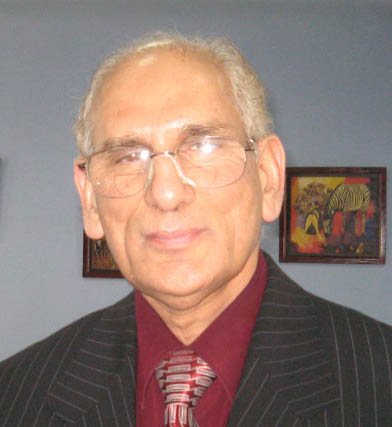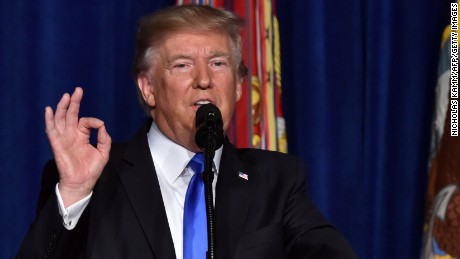www.aljazeerah.info
Opinion Editorials, September 2017
Archives
Mission & Name
Conflict Terminology
Editorials
Gaza Holocaust
Gulf War
Isdood
Islam
News
News Photos
Opinion Editorials
US Foreign Policy (Dr. El-Najjar's Articles)
www.aljazeerah.info
America Searching Foes and Friends in Pakistan and Afghanistan
By Mahboob A Khawaja Al-Jazeerah, CCUN, September 12, 2017 |
 |
 |
|
|
President Trump giving a speech about his administration's policy in Afghanistan, August 24, 2017 |
Is the Trump Administration Rational to Use the
Blame-Game?
American leadership needs critical thinking about its failure and
triumph in global relationships. After 16 years of warmongering and
perpetuated violence on the people of Afghanistan, President Trump is
challenging his own inner psychological attitude towards war and peace
in South West Asia. As a candidate Trump, he voiced strong opposition to
continued US military engagements in Afghanistan and Iraq.
Ironically as President Trump,
he is opting for wrong turns and slipping into vice and ruin by
revisiting the triviality and viciousness of the US invasion of
Afghanistan and drone attacks against the innocent Pakistani civilians
in North-West Waziristan. His suspicious strategy unfolds a paranoid and
vengeful foresight to blame Pakistan
- what essentially went wrong with the US bogus war on terrorism.
We live in a paradoxical world where sincerity and virtues could be
misinterpreted as follies against the American self-interest. In
September 2001 after the 9/11 attacks, it was Pakistani dictator General
Pervaz Musharaf who responded to George Bush phone call on a two
hour notice – “either you are with us or against us”, and was coerced to
collaborate and support the American war agenda in Afghanistan. George
Bush needed some solace to prove that he was doing something against an
imaginative enemy living in Afghanistan. The truth is that Afghanistan
or its people never attacked America nor threatened its security in any
sense of rationality. The invasion of Afghanistan was planned by
the US long before the 9/11 attacks. Its aims included building gas
pipelines from Central Asia via Afghanistan and negotiated contract with
Bin Laden for natural gas in Afghanistan.
General Musharraf
lacking wisdom, leadership and legitimacy of the governance fell to the
US entrapment in a state of terrible helplessness as most often one
track dictators do. For almost decade and a half, Pakistanis
contributed resources, intelligence and practical help to support the US
war agenda in Afghanistan. Contrary to the global moral and ethical
principles of relationships between the friends and allies, President
Trump should have thanked Pakistan for its strategic help; instead he is
sending hysterically compulsive signals which sound irrational and
disruptive to mutual relationship. Naïve and insane egoism appears
to be at work if Pakistanis are accused to be of dubious character and
engagements in the US-led Afghan war theater. Understandably,
General Musharaf and his colleagues were paid to do the proxy war and
its spill-over impacts decades later having devastating effects on the
civilian life across Pakistan. Terror is always terror in all shapes and
forms. America did not invade Afghanistan to protect the human rights,
democracy or to restore law and order. It was a war of terrorism
that made no rational sense in any criterion-based critical analysis. To
an impartial observer of the US domestic politics, President Trump is
reinventing the foreign war strategy to distract attention from his own
mismanagement of the in-house racial tensions overflowing historic
rivalries across America. Perhaps, shifting lines of argument, President
Trump needs an opportunity of self-reflection what he said or should
have said as the leader of the nation on a highly sensitive and
explosive racial problems hinging on the American psyche at
Charoletville (Virginia), Boston (Massachusett) and elsewhere. Public
momentum expected bold and inspiring message of optimism not distortion
of the prevalent facts of the American racial paradigm.
Towards Rethinking of a New Strategy for Peace and Negotiated
Resolution
In a changing world of global thinking and friendly relationships
with others, American foreign policy experts should think critically how
best they could communicate to a friend in Southwest Asia and enlist
urgently needed moral and practical support to pave the ways for a
peaceful settlement of the Afghanistan crisis. America is a military
power but its legend of invincibility has been torn apart by small
groups of fighters in Afghanistan. Much of this land of ancient tribal
herdsmen is in ruins, its economy, political and civic infrastructures
and productivity devastated by the insanity of war and civilian lives
float between obsessed insecurity, daily bombings and extended
graveyards. America cannot undo the history of its own ruthless
engagement and strategic failure. This consequence is of its own failed
strategy or no strategy at all, and not of the role of Pakistan or
others. If American rational impulses are intact, its policy should
focus on a multilateral approach including Pakistan, Iran, China and
Russia to work out a negotiated settlement in Afghanistan. America needs
to be rational and see the mirror of its prolonged involvement in a war
that has consumed more than 3,000 lives of US soldiers and almost 10,000
wounded veterans. President Trump or his military advisors should
realize what went wrong in Afghanistan and how to rebuild the self-image
of a superpower occupied effectively by a handful of Talibans or almost
dead Al-Qaida - once who were its allies in fighting against the former
USSR. This is no excuse to go on radiating violent and undiplomatic
overtures to Pakistan or to reinforce aggression against the people of
Afghanistan. America needs a safe exit from the prolonged crisis.
Pakistani leaders should be careful to assess their own weaknesses and
strength and learn from the past as to what mistakes were made in
military collaboration with the US scheme of things in the region. At
the outset, the US next action plan is geared towards antagonism and
miscalculation of the facts of the changed geo-politics of the region.
India was not the participant in the Afghanistan theater, it was
Pakistan that is both alleged to be a foe and asked to be a friend.
These dubious assertions hardly correspond to any reality check. Under
Obama, increased American drone attacks charcoaled several thousands of
innocent Pakistani civilians and destroyed human habitats in North
Waziristan and American accountability for these crimes cannot be
ignored. It should be the national interest of Pakistan and its peaceful
role in a dialogue between the combatant parties and pursuit of a
negotiated resolution of the Afghanistan war torn country. If the Trump
administration is keen to value the friendly ties with Pakistan, the
causes of US failure in Afghanistan are known but a focused policy and
action plan for peacemaking is unknown. This objectivity should be
enhanced to usher a moment of focused reality away from the nuisance of
domestic racial politics. It will substantiate good intelligence
foresight to avoid repeating the losses of time, personnel, resources,
prestige and sustainable future to all concerned.
***
Dr. Mahboob A. Khawaja specializes in global security, peace
and conflict resolution with keen interests in international affairs,
Islamic-Western comparative cultures and civilizations, and author of
several publications including: Global Peace and Conflict Management:
Man and Humanity in Search of New Thinking. Germany, May 2012. His
forthcoming book is entitled: One Humanity and the Remaking of
Global Peace, Security and Conflict Resolution.
***
Share the link of this article with your facebook friends
|
|
|
|
||
|
||||||


